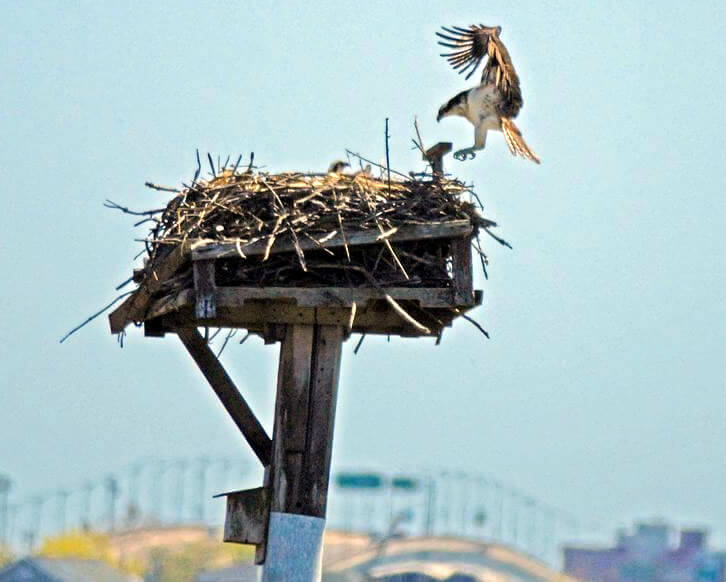Sometimes, the best thing to help wildlife is to leave it alone.
Nests
Whether it’s on the beach, in a forest, or in your backyard, do not approach an active nest.
Nesting animals are very wary of people near their nest, sometimes to the point of abandoning the nest and eggs because somebody got too close. There are also many predators that may watch you find the nest or follow your scent to the nest, and feast on the eggs or chicks once you leave.
Beginning as early as the middle of May and extending into late June or even early July, all of New Jersey’s turtles seek out a place to lay their eggs, often at a distance from where they reside the remainder of the year. Locations for nesting sometimes include the sides of roadways or a backyard. Please allow the female turtles space and time to safely lay and cover their eggs. Turtles do not guard or protect their nests after they are done and will soon be on their way. New Jersey DEP Fish and Wildlife does not offer a service to remove turtles or turtle nests from a property. Most turtle eggs will hatch in 60-90 days and the hatchling turtles will independently make their way off into the world.



Be careful when walking off-trail
Turtles and many birds nest on the ground. When hiking or walking the dog in the spring and summer, stay on the trail as much as possible and keep pets on a leash. If you have to walk off the trail, watch where you step and try to avoid dense vegetation (for birds) or freshly moved dirt (for turtles) to avoid stepping on a nest. Stay off the tussocks if walking through a wetland.



Orphaned Wildlife
Leave young wildlife undisturbed.
Every year, especially around spring and summer, the lives of many young animals are disrupted. Well-intentioned people may attempt to “save” these animals while most often, especially for fawns and young raccoons and rabbits, the mother is nearby.
For young chicks that cannot fly, the best thing to do is to put the bird carefully back into the nest. If you can’t reach the nest, place the bird on the ground in a thick shrub.
The best thing you can do to protect young wildlife is to keep cats indoors.


Please remember that it is illegal to attempt to keep wild animals as pets in New Jersey.
Feeding Wildlife
It is illegal to feed bears in New Jersey, and feeding wildlife is highly discouraged (especially deer).
NJ DEP Fish and Wildlife advises against supplemental feeding of wildlife because it is not necessary to sustain wildlife populations. People should keep in mind that deer and other wildlife are wild animals and have adapted to cope to the sometimes harsh winter weather, including deep snow, cold temperatures and high winds.
Backyard bird feeding during winter months (when bears are not around) is acceptable, but feeders can increase the risk of harm to the birds when not maintained. Click here to find out more.
More information about why you shouldn’t feed wildlife can be found here.

Exceptions
Injured or Sick Wildlife
In the spring and summer months, you may find what appears to be sick, dead or injured wildlife. Wildlife that appears sick or that died for reasons that aren’t apparent can be reported to the DEP Hotline by calling, toll-free, 877-WARN-DEP (877-927-6337). Do not report obvious road kills. If the animal is really injured and needs help (not feigning an injury), contact the nearest wildlife rehabilitator.
When a turtle is crossing the road and in danger of being run over.



If it’s safe to pull over and help it, pick up the turtle towards the rear of the shell and place the turtle several feet off the roadway in the direction it was traveling. If you can’t tell which way it was traveling, choose the side of the road that appears to have the most suitable habitat.
 Official Site of The State of New Jersey
Official Site of The State of New Jersey
